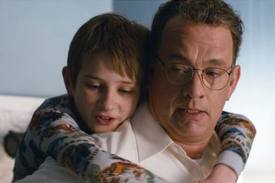- Get link
- X
- Other Apps
Featured Post
- Get link
- X
- Other Apps
I have been waiting - anxiously - for the film version of Jonathan Safran Foer's stunning novel Extremely Loud & Incredibly Close for ages and ages. Anxiously because I adored this book and was afraid it would be too dense and too difficult a book to adapt. And to watch.
If you have read the book, you know what I mean. Oskar Schell is no ordinary boy; he's extraordinary. I have a personal theory that he may have Aspergers (a form of high functioning autism) but that's not presented in the novel and I haven't researched that. It's just my hunch that this amazingly bright and creative and sharply focused boy who has no friends of his own age and who has been so indulged by the adults in his life probably has Aspergers. I love Safran Foer's Oskar. I was afraid, from the seeing the trailer, that the filmmakers would turn him into a pedantic, unlikeable, little fuss-budget.
And I was - and still am - afraid of how I might react emotionally to the film. Reading the book at home, I cried and cried. Streaming tears. Uncontrollable. I do NOT want that to happen in a theatre. So I'm dying to see it and terrified to see it. But it's not playing in my suburb yet. I would have to drive 45 minutes to see it in Hollywood which is a really good excuse for delaying the pain - the pain of being heartbroken if it's terrible. The pain of breaking down publicly in a theatre if it mimics the book!
I just read this review by David Denby. Here's some of what he had to say. To read the entire review, go HERE
SPOILER ALERT (just don't read this if you don't want to know!)
I have a horrible feeling that my worries have been warranted! Except maybe in regards to Tom Hanks who I have been dreading as the father. (Oh I have blogged ad nauseum about that. Go to the Search bar to see my other posts about Extremely Loud & Incredibly Close) Anyway, here's what Denby says
“Extremely Loud & Incredibly Close” is an example of what happens when an author’s fluent literary conceits give way to the sight of all-too-human people moving and talking in the real-world spaces of a movie. Jonathan Safran Foer’s 2005 novel is about a nine-year-old boy, Oskar Schell, who has lost his father, Thomas, in a collapsing tower on September 11, 2001. A year later, rummaging through Thomas’s things, Oskar finds an envelope containing a key, which he assumes will unlock a box or something that will reveal a new aspect of his father to him. The word “Black” is written on the envelope, so Oskar runs all over New York looking for people with that name. The pursuit is a way of holding on to his father, of keeping the lines of communication open, of refusing to close the door. The boy’s voice, as Foer creates it, is a babbling brook of hopes and questions and bits of information on every imaginable subject. In the novel, we can enjoy all of this heroic spieling and exploring as a form of antic play. It never occurs to us that an actual little boy, however bright, however maddened by grief, could talk this way. Oskar’s voice is a writer’s virtuoso construction, and Foer combines it with the voice of Oskar’s grandfather, photographs of falling bodies, odd dialogues, lists of numbers, garbled paragraphs, nearly blank pages, and many other typographical adventures. The novel is a kind of postmodernist collage stained with tears.
... An elderly gent (Max von Sydow), who turns out to be Oskar’s mysterious grandfather, shows up and moves in with the grandmother. He hasn’t spoken in years, but he communicates with his palms, on one of which is written “Yes” and on the other “No.” He writes out longer messages on a pad. A little of that goes a long way, too, though the emotion in von Sydow’s heavy, silent face is an enormous relief from Oskar’s incessant prattle. When Oskar starts to play the messages on the machine for the old man, he signals the boy to stop—after all, Thomas Schell is his son. He wants the boy to shut up, and, with all the sympathy in the world, the audience may wish the same."
As you can imagine, the thought of wanting Oskar to just shut up makes me very, very sad. Of course I will see the movie myself. I will bring a box of Kleenex and an indulgent attitude. As I said, I love Oskar and like a parent, I'm prepared to find his oddities endearing. The little boy has, after all, been through a lot. He deserves a little patience, a little love.
David Denby review
Extremely Loud and Incredibly Close
Jonathan Safran Foer
Max Von Sydow
Sandra Bullock in Extremely Loud and Incredibly Close
Thomas Horn
Tom Hanks
- Get link
- X
- Other Apps



